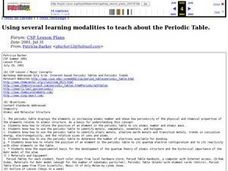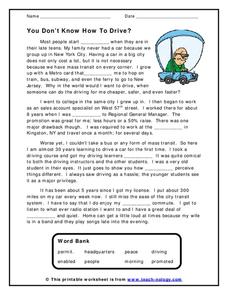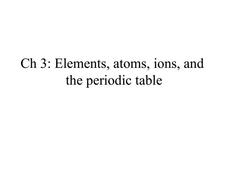Curated OER
The Periodic Table
In this periodic table worksheet, students complete a paragraph containing facts about the periodic table by filling in 18 terms from a word list.
Curated OER
Mill-Worker Simulation
Students participate in a simulation in which they transition between a farm economy to a factory economy They discover labor relations during the 19th and 20th century. They discuss the impact mass produced goods on the economy.
Curated OER
Using several learning modalities to teach about the Periodic Table.
Students identify how to relate the position of an element in the periodic table to its atomic number and atomic mass. They identify how to use the periodic table to identify metals, semimetals, nonmetals, and halogens, and also,...
Curated OER
Search Warranted?
Young readers work on evaluating claims in a piece of informational text with the article "In New York, It's Open Bag or Find Exits" from the New York Times. They analyze current search procedures implemented to fight terrorism and...
Green Education Foundation
How Loud is Too Loud?
Ever wonder how loud a sound has to be to cause damage? Young scientists explore sound properties by researching decibel levels. They discuss how sound is perceived by our ears and our brains and why it can cause negative health effects...
Curated OER
English Vocabulary Skills: AWL Sublist 5 - Exercise 1b
In this online interactive English vocabulary skills instructional activity, high schoolers answer 10 matching questions which require them to fill in the blanks in 10 sentences. Students may submit their answers to be scored.
Teach-nology
You Don’t Know How to Drive?
A cloze reading passage about getting a driver's permit at an older age prompts kids to use context clues as they read. They can use the word bank below to fill in eight blank spaces throughout the story.
Curated OER
Urbanization As Seen Through Late 19c - Early 20c Architecture
Incorporating the cultures, architecture, and ethnic populations of several American cities (namely Chicago and New York), this presentation displays vivid photographs of buildings and people in 19th - 20th century urban America. The...
Curated OER
Stop the Bus! America Wants a Ride
Middle schoolers compare the fuel efficiencies of various modes of transportation and graph the results. They, in groups, design and conduct a forum to discuss ways to improve on lifestyle actions and limit excessive pollution for the...
Curated OER
Utah's Harvest
Fourth graders recognize the importance of the physical geography on a community. In this commodities lesson, 4th graders graph the five most important commodities of Utah. Students understand why these commodities are so important.
Curated OER
Magnetic Levitation
Students conduct a series of experiments on magnetic levitation. In this physics lesson, students discover how Maglev trains operate. They explain how magnetism make even simple objects levitate.
Curated OER
Maglev Trains
High schoolers explore how Maglev trains work. In this technology instructional activity, students discuss the pros and cons of Maglev compared to conventional trains. They build a simple Maglev train model.
Curated OER
Atomic Properties of The Elements
In this chemistry worksheet, students examine the periodic table and how it is used in the context of interpreting compounds and their structure.
Curated OER
Typical Numeric Questions for Physics I - Atomic Spectra
Seven practice problems are presented to physics pros in this assignment. Given the wavelengths, they perform computations for emission spectra. This brief activity makes an appropriate pop quiz.
LABScI
Atomic Structure and the Periodic Table of Elements: The Secret Agent Lab
Food always gets attention! Model atomic structure using fruit loops to represent the subatomic particles. After building models, scholars create ionic bonds using their models. Finally, they use these concepts to create a periodic table.
Curated OER
Elements, Atoms, Ions, and the Periodic Table
This PowerPoint provides a complete recap of all the information needed for a unit on elements and the periodic table. The seventy slides cover the basic notation of elements, energy levels and ionization energies. The trends in the...
Walden Woods Project
19th Century Lessons for 21st Century Lives
The words of Henry David Thoreau on Civil Disobedience seem particularly relevant today, as are his writings and those of other transcendental thinkers who ask what it mean to live deliberately and what are the responsibilities of...
Curated OER
Water and Ice
Students observe what happens to water as it goes from a solid to a liquid. In this exploratory lesson plan students gain an understanding for the water cycle while working in groups observing what happens to water as it changes state.
Curated OER
Percent Applications
In this percent application learning exercise, learners solve word problems containing concepts such as percent, proportions, sale price, discounts, interest, commission, tax, and more. Students complete 11 problems.
Curated OER
The Structure of the Periodic Table
In this chemistry instructional activity, students select the best answer for 26 multiple choice questions from the drop down box. They describe how elements are arranged in the periodic table.
Curated OER
History of the Periodic Table
Learners sort a group of manipulatives and then explain their organizational system to the class. They discuss the work of scientists trying to organize the elements into a system that made sense and the development of the periodic table.
Curated OER
Ionic Chemical Formulas Days 1 & 2
Students study polyatomic ions and write binary and ternary ionic chemical formulas. They explore putting together different monatomic ions and coming up with as many chemical formulas as possible. They play a game similar to memory...
Stanford University
Women in the 1950s
Students learn about suburban communities in the 1950s. In this women studies activity, students watch a Power Point presentation about suburban communities in the 1950s. Students look at images from the 1950s and discuss what they think...
Curated OER
West Indies and The Caribbean: Sugar & Slavery
Students study the state of the world before the slave trade. They explain the geography and economics of the slave trade. They explore primary sources and how historians use these sources to create historical interpretations.

























